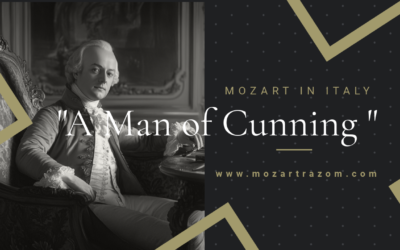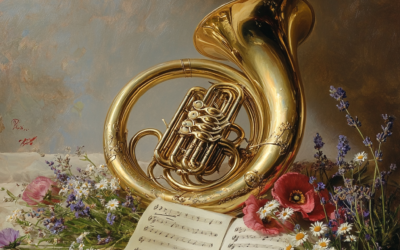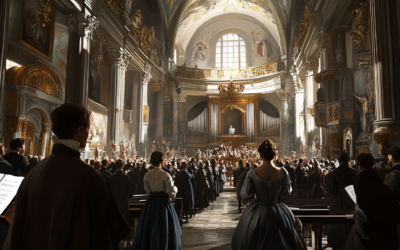Mozart’s German Mask
Mozart, the Anschluss, and Nazi Propaganda
After the 1938 Anschluss and Hitler’s entrance into Vienna, the Nazis seized upon Mozart’s legacy, portraying him as the embodiment of Germanic identity and cultural superiority. Adolph Meuer, writing for the Signale für die musikalische Welt, claimed that the unification of Austria and Germany was inspired by Mozart himself, who, according to Nazi rhetoric, expressed his ‘adamantine German voice’ in his music and suffered when he was abroad. The 1941 Mozartwoche des deutschen Reiches further intensified these efforts, led by figures like Alfred Weidemann and musicologists of the regime, who aimed to align Mozart with the greatest German composers. The celebrations cloaked in ‘international’ allure were, in truth, tools of propaganda, reinforcing Nazi ideals while suppressing foreign influence. This appropriation distorted Mozart’s legacy, painting him as a symbol of racial purity and nationalistic pride.
Mozart: The Fall of the Gods
This book compiles the results of our studies on 18th-century music and Mozart, who has been revered for over two centuries as a deity. We dismantle the baseless cult of Mozart and strip away the clichés that falsely present him as a natural genius, revealing the contradictions in conventional biographies. In this work, divided into two parts, we identify and critically analyze several contradictory points in the vast Mozart bibliography. Each of the nearly 2,000 citations is meticulously sourced, allowing readers to verify the findings. This critical biography of Mozart emerges from these premises, addressing the numerous doubts raised by researchers.
"The Salzburg Festival became a platform for Nazi propaganda, distorting Mozart’s legacy to fit their nationalistic and racial agenda."
Mozart: The Fall of the Gods
The Nazi Appropriation of Mozart
In 1938, following the Anschluss and Hitler’s triumphant entry into Vienna, Nazi propaganda found a perfect symbol in Mozart to justify their political aims. Adolph Meuer, writing for Signale für die musikalische Welt (The Musical World Gazette), proclaimed that the union of Austria and Germany had been inspired by Mozart himself. According to Meuer, the Salzburg Festival, now finally “international,” would honour the greatest of musicians, one who, “speaking purely German in music,” felt “fiercely German,” so much so that he suffered when abroad and “prayed daily to honour himself and the entire German nation.” Thanks to Mozart, Germany’s national forces had reunited, and Austria had at last reconciled with its motherland.
Reinventing Mozart’s Identity
To prove Mozart was truly German, despite Salzburg in the mid-18th century being neither Austrian nor German but an independent principality, the Nazis had to dig up late 19th-century arguments. In preparation for the 1941 celebrations, they emphasised similarities between Mozart and the greatest German composers. The task was personally handled by writer and director Alfred Weidemann (1916-2000), who, in a small booklet, revived an old thesis by musicologist Ludwig Nohl, detailing the influence of Mozart on Wagner.
The 1941 Mozart Week and Nazi Ideology
Exactly 150 years after Mozart’s death, the commemorative book for the Mozartwoche des deutschen Reiches (German Reich’s Mozart Week) in 1941, co-authored by Schenk, Schiedermair, and Orel, celebrated the Germanic spirit of Mozart’s work. It highlighted the Germanic qualities of the composer and glorified the superiority of German art. That same year, Joseph Goebbels attended a performance of The Marriage of Figaro at the Berlin Opera, noting in his diary his annoyance at the excessive presence of Jews in the audience.
A Façade of Respectability
The Nazis cloaked the celebratory concerts held in Germany and the occupied territories in a façade of respectability, but their intention remained to elevate compatriots and undermine foreigners. While Damisch led the Wiener Mozart-Gemeinde, he also presided over the German Reich’s Mozart Week, where, under his control, regime musicologists like Schiedermair, Haas, Müller von Asow, Gregor, Orel, Engel, Steglich, and Valentin delivered lectures.
Racism and Propaganda
The Mozartwoche was governed by racist criteria. The speeches by Baldur von Schirach and propaganda minister Joseph Goebbels during the Mozart celebrations bear witness to their disdain for foreigners. The supposed “international” aspect of these events was a mere illusion. Outwardly, they presented a cultured, peaceful image, while Hitler and his generals constantly contemplated war, and thousands of Jews were being incinerated in crematoriums.
Musicology and Nazi Ideals
The SS were tasked not only with protecting the Nazi elite and exterminating those deemed “racially and biologically inferior,” but also with advancing the study of race. Heinrich Himmler funded Joseph Müller-Blattau’s musicological studies on Aryan music, tracing it to folk traditions, and Karl Gustav Fellerer’s efforts to demonstrate the Germanic roots of Gregorian chant with substantial financial backing.
The Lasting Legacy of Nazi Musicology
An authoritative legacy from these “research” efforts was Die Musik in Geschichte und Gegenwart, conceived during the Nazi era. It remained recommended reading during our university days. Friedrich Blume, then editor-in-chief, continued his role unchallenged until 1968, writing further “essential” contributions to modern musicology on Mozart and the “Viennese classicism.”
You May Also Like
A Revolutionary Encounter at Cremona Musica
Sharing insights on Mozart and the Neapolitan school at Cremona Musica, the premier global stage for music and culture.
#1 A Man of Cunning
In the end, Leopold Mozart’s life was a testament to survival in a world where his talents were often overshadowed by those of his more gifted contemporaries and his own son. While his “Violinschule” remains a notable contribution to music pedagogy, it is clear that Leopold’s legacy is as much about his ability to navigate the challenges of his time as it is about his musical achievements. His story is one of ambition, adaptation, and the lengths to which one man would go to secure his place in history, even if that place was built on borrowed foundations.
@MozartrazoM
Mozart’s Letters: A Legacy of Disappearances, Edits, and Forgeries
Mozart’s letters reveal missing originals, questionable authorship, and forgeries, adding complexity to his legacy.
The Curious Case of Mozart’s “Lullaby”
Though long credited to Mozart, the lullaby “Schlafe mein Prinzchen, schlaf ein” hides a murky history. Initially published by Nissen, Constanze’s second husband, it has endured as one of Mozart’s supposed works—despite a trail of doubts. In 1798, Constanze herself noted sending “another piece of Mozart’s in place of the lullaby,” raising questions about its origins. By the 20th century, researchers revealed it as the work of lesser-known composers, yet it remains deceptively tied to Mozart, its myth surviving through mere footnotes.
The Contradictions Behind Mozart’s Horn Concerto K.412
The authenticity of Mozart’s Horn Concerto K.412 remains hotly debated, as the work bears numerous contradictions in its manuscript history. The first movement may be original, but what about the rest? The inclusion of Franz Xaver Süssmayr and later editorial meddling raises serious questions about what we are really listening to when we hear this ‘Mozart’ concerto.
The Questionable Attribution of Mozart’s Offertorium K.34
Attributing Offertorium K.34 to Mozart is not just misleading, it reflects the careless methods used by 19th-century scholars to inflate his legacy. Without an autograph or solid evidence, this work should not be considered part of his output.”







